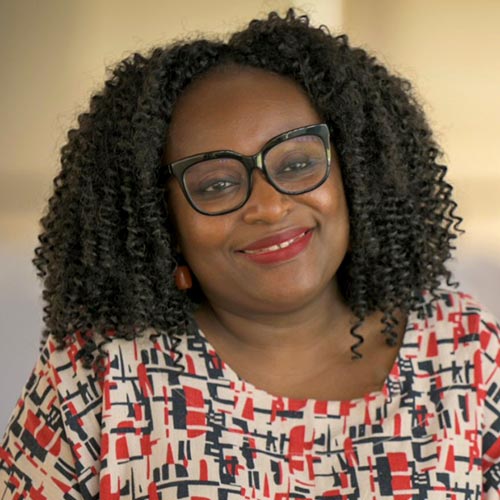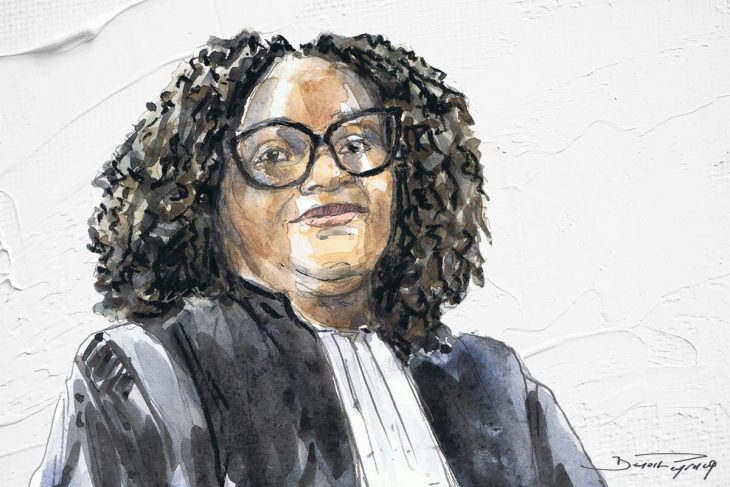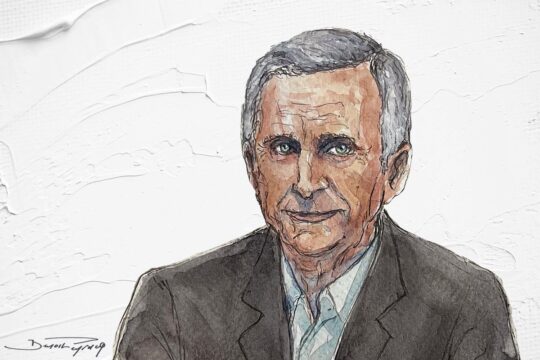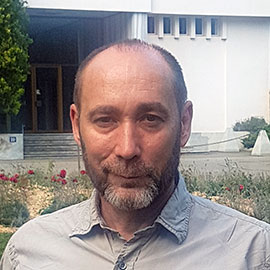JUSTICE INFO IN-DEPTH INTERVIEWS
Anta Guissé
Lawyer at the Paris Bar
For more than 20 years, Franco-Senegalese lawyer Anta Guissé has worked for the defence at international tribunals for Rwanda and Cambodia, as well as the International Criminal Court. Now she has just pleaded for victims’ families in Burkina Faso in the trial on the assassination of former president Thomas Sankara, where the verdict is expected on April 6. She talks to us about how she sees such trials for “exceptional crimes”.
JUSTICE INFO: On October 15, 1987, the president of Burkina-Faso Thomas Sankara was assassinated with twelve of his companions in a coup. Thirty-five years later 14 people, of whom two are still at large, are being prosecuted for these murders and for "attacks on state security and complicity in attacks”. In your plea you called it a “crime of exception in the midst of ordinary crimes" that "shakes the social order to its foundations". In what way should this political assassination be considered a major crime, even if it is not an international crime?
ANTA GUISSÉ: The attack itself is a crime of exception, it is judged separately. Assassinations, on the other hand, remain crimes under common law. Its particularity is that it was committed against a head of state. Burkina Faso has experienced many coups d'état, but this one was the bloodiest. It was a bloodbath in the form of an execution. What is also particular is that it was premeditated and prepared, for while Sankara was being killed at the Council of Entente [the seat of executive power], the people thought closest to him who could have intervened to foil the coup were also killed.
It was a pivotal moment in African history, when we could have moved to another way of government on the continent, another way of seeing the relationship between former colonizing countries and former colonized peoples. The fact that this possibility was smashed so violently and by Sankara’s best friend [Blaise Compaoré, president of Burkina Faso from 1987 to 2014] adds a somewhat Shakespearean dimension.
Sankara and the revolution in Burkina remind me of being a teenager at the time and what it meant to many people. My parents are left-wing and were activists; a Burkinabé friend often came to stay with us and died during those events. We always talk about the people killed at the Conseil de l'Entente, but unfortunately other people also died or disappeared in strange circumstances in the weeks and months that followed.
I remember an enormous sadness. I am in contact with Africans from all walks of life, and when they learn that I took part in this trial [as a lawyer for the civil parties], they all remember the day they learned of Thomas Sankara's death - and they all weep. All of them, regardless of their nationality.
So it is the history of Burkina, but not only that. Because of Sankara's strong positions and speeches, it is the history of Africa. He was the king of the "punchline"! It was the time of the Houphouëts [Félix Houphouët-Boigny, president of the Ivory Coast from 1960 to 1993] and Eyademas [Gnassingbé Eyadéma, president of Togo from 1967 to 2005], and Sankara was this young man who was leading a poor country but who suddenly found himself on the stage of the greats because he had such dignity, a will to work with what we have got and have another vision of development. There were certainly mistakes made during the revolution, but we cannot take away from Sankara that he was extremely honest, and that made a big difference compared with other leaders of the time and those who followed. It was a great hope that was totally destroyed.
Thirty-five years after the events, in judicial terms, the evidence may have disintegrated, but we also have the benefit of distance. We now see clearly who did what with this revolution.
We had a real trial, with ballistic experts and interventions on the facts: how people were killed, when, what happened in the months before October 15 and after.
Isn't this what we call a trial for history?
Yes, but not only. We had a real trial, with ballistic experts and interventions on the facts: how people were killed, when, what happened in the months before October 15 and after. I would rather say that it is a trial in line with history, in the sense that we have elements of understanding that we would not have had if we had judged the facts in the aftermath - for example, a certain number of French diplomatic cables that expose the various explanations given by the Compaoré clan, the tensions in "Françafrique" and in Côte d'Ivoire.
What do you take away from this trial? What did we learn?
That the crimes were really premeditated, that it had been going on for many months or even longer. There had been several assassination attempts before. Thomas Sankara knew that his life was in danger and he voluntarily refused to enter into this spiral. We learned that Blaise Compaoré was a real traitor - we suspected it, but it is now more apparent - and that he was a political animal. Both nationally and internationally, he had made sure that there would be no repercussions.
You have already acted as a defence lawyer before the Khmer Rouge Tribunal in Cambodia, where the facts were also being tried 35 years later. What is the function of a court in trials of this kind?
I can't see any parallels between the trial of Khieu Samphan [president of Pol Pot's Democratic Kampuchea between 1975 and 1979, sentenced to life imprisonment in 2014 and again in 2018 for war crimes, crimes against humanity and genocide] and the Sankara case. The Sankara trial is really that of an assize court; we are not just talking about political leaders, we are talking about the setting up of a commando. The facts are very different: we are not judging Compaoré on his management or his policies during his 27 years in power. It is really the attack that is being prosecuted. Of course, when we plead the case, we put the political dimension into it, but in the end, we are talking about the 13 assassinations that day. It is extremely precise, with people who held the weapons, who participated in the preparatory meeting, etc.
There are two major absentees from the trial: former president Blaise Compaoré, who has taken refuge in Côte d'Ivoire, and Hyacinthe Kafando, the leader of the commando group, who is on the run. How much has this diminished the interest of the trial?
It did not diminish it. We could have had these defendants present but silent -- even if the people of Burkina would have liked to hear their voices.
The courts dealing with these historic trials are often tempted to write history. How do you deal with the risk of jurists taking themselves for historians?
In the Sankara trial, the family did not want to rewrite history at all. For them, Sankara and his companions were assassinated with explanations that were false, and it was important to set the record straight. There was, of course, a historical context, but we were talking about very precise things. Thomas Sankara was killed that day as he was leaving the Council of the Entente and was not armed. He and his companions were executed. Period. It was a political assassination with the aim of taking power. We did not rewrite the history of the revolution. There were no experts on the historical context. We really talked to the actors and direct witnesses of the time.
Judges are not supposed to fight impunity; they are supposed to judge impartially.
And in the trial of the former Khmer Rouge leaders?
In this type of trial, the role of the defence is to remind people that we are before a criminal court. We are here to judge a man for acts that he is supposed to have committed. At the Khieu Samphan trial, we were told about the Khmer Rouge, the regime, etc. The relationship between the man and the facts is diluted. The fight against impunity is presented as the flagship of these courts, whereas the fight against impunity is the sole responsibility of the prosecutor. Judges are not supposed to fight impunity; they are supposed to judge impartially. This is where the problem often lies. We are dealing with extremely complex facts, with levels of responsibility, notably the "joint criminal enterprise", where it is said that the accused did not need to have the desire to commit a crime, that it was sufficient that it was a foreseeable consequence. How can one be responsible for a crime that one did not want to commit? These are intellectual constructs to ensure that people who were political leaders at a given time can also be held criminally responsible for crimes they did not commit in person. One understands the moral will [that underlies this objective] but one can arrive at totally schizophrenic positions on what it is to commit a crime and what criminal responsibility is. These are trials where there is a presumption of guilt. As the defence, we remind people that in criminal cases, there should be a presumption of innocence.
A lot of expectations are placed on these trials, without it being said that they will never offer everything we want. We hear big speeches about the fight against impunity, reconciliation, and truth, but on facts as complex and as extended in time as these, there is not only one truth - and this is true of any trial.
But there is often a tension between the criminal and the historical. In Cambodia, before the opening of the first trial, the international prosecutor declared before an assembly of Cambodians that it was not a question of judging an ideology. A man from the countryside stood up in the room and told him that in that case he was only prosecuting "smoke". In everyone's mind, these trials were obviously judging an ideology. How do you understand this tension, when ideology is at the heart of the crime?
In the case of the Khmer Rouge, one of the big legal problems was that it was explained to us the political vision of the Khmer Rouge was not in itself criminal, but that the means used were necessarily criminal. We were faced with a big gap. The theory of a joint criminal enterprise, in which the crimes were foreseeable and the defendants were responsible, did not apply. And it was necessary to retain this mode of responsibility. We said that if one is transforming a mode of responsibility because one cannot make the link with the crimes otherwise, this is not law. We never argued that there were no crimes at such and such a place; we simply said his participation in such and such a meeting does not lead to the conclusion that he participated in committing these crimes.
Certain jurisdictions are designed to allow the international community to clear its conscience a bit. I am not very sure that international courts really serve to avoid the repetition of crimes.
There is a more philosophical question behind this: is a criminal trial right for this type of case? This is a real issue and it is all the more problematic when the events happened decades ago and most of the direct perpetrators are dead.
I think that if Khieu Samphan had not been the last of the Khmer Rouge leaders alive, we would not have reached the same result. At a certain point, one works with what is available and says that there is no other way but to convict. After the first conviction of Nuon Chea [former number 2 of the Khmer Rouge regime, sentenced to life imprisonment in 2014 and again in 2018 for war crimes, crimes against humanity and genocide] and Khieu Samphan, a newspaper established the amount of money spent to reach this judgment and said that we finally had justification. When it comes to individuals who are essentially politically responsible, one must read the justifications, but the judgments are 2,600 pages long and no one reads them. If one does not try to understand but only to validate a starting position, what was the point of a trial?
I believe very much in the educational value of a trial. Certain jurisdictions are designed to allow the international community to clear its conscience a bit on situations where it did not intervene. I am not very sure that the jurisprudence of international courts really serves to avoid the repetition of crimes. Those who are often missing from the dock are those who had the power to make decisions at the time of the crises. Whether in the Central African Republic or in Rwanda, it is frustrating to know that there were United Nations missions on the ground and that the crimes were not prevented. This should challenge us: what are we doing wrong that this happened again?
You defended Khieu Samphan, a revolutionary who served a reviled ideology that destroyed millions of lives in the name of class struggle. Your Rwandan clients were accused of embracing a racist ideology that cost hundreds of thousands of lives. In the Sankara trial, you represented the families of people close to a man revered for his anti-colonial, pan-African ideology and visionary ideas. Was it a breath of fresh air for you to be on the side of the victims and of a positive icon?
I have always liked to be on the defence, because I like to take the time to try to understand and not to have a Manichean vision of things. In the Sankara case, there is a more personal dimension, assisting the family of a person I particularly admire and who played an important role in my own personal path. It's a breath of fresh air because it's a different way of working, the pressure is different. In other trials where I was a defence lawyer, there was a much more intellectualized aspect. In Sankara, it was clearly more emotional. In my plea, I was overwhelmed by emotion and I did not expect it. I have sometimes been very moved listening to people testify in international tribunals, but when I was pleading in Sankara, it was new. To "defend" an icon whom one has respected is a special professional experience, one of the most beautiful I have ever had.
Was it nicer to be loved by the public, instead of being the ugly duckling?
It's a job where you learn to be loved one day, and not the next. I look at it with a little amused distance. Of course, it's more pleasant not so much to be loved - that's a very furtive feeling - but to carry the word of a family and to represent a man who had a vision and who died for it.
Would you have been able to be on the defence in the Sankara case?
No I could not, I would not have accepted, because of the emotion. Lawyers must go where they know they can do a good job.
How can Cambodians understand this when you agreed to defend Khieu Samphan?
Again, because for me it was perhaps easier to put an intellectual distance on the facts when I had no personal history. One does not necessarily do a good job if one is too close.
Rwanda, Cambodia, Burkina Faso: in all these cases, the defence lawyers in particular point the finger at foreign responsibilities, which are never judged by these criminal courts. How do you feel about this?
It is one of the freedoms that we have as lawyers to put all this forward. There is the trial in the courtroom and what will come out of it to fuel debate outside. What you put forward in a court of law can feed another discussion.
But is it a source of frustration, or do you accept it?
It's a question of [balance of] power. I don't accept it, but we can denounce it. Bringing these flaws to court is a way of exposing them. I am well aware that States act according to their interests and that, as long as the balance of power is like that, it is difficult to change things. It is not a trial that changes the world. The fact that we are only dealing with individual responsibility implies that we are only interested in one part of the problem.
You often denounce international justice as being "out of touch" and here you are again as defence counsel in the trial of Central African Alfred Yekatom before the International Criminal Court. Why do you continue?
There is a particular adrenaline in these trials. In defence, we have the means to explore things that we cannot necessarily do in a national practice. The real question is the way in which the debates are conducted at the hearing. It is true that after having tasted national justice in the Sankara trial - even if on different facts -, knowing that the public can come, that it follows what is said in the press on a daily basis, that the actors speak openly, gives us a particular impact that we do not necessarily have in an international jurisdiction.
Like many black women and men who manage to have some professional visibility, we know that we want to do well since, given the prejudices, it would risk closing the door to others.
Does being a black woman change anything in these international courts?
It's more a matter of people’s perception. Like many black women and men who manage to have some professional visibility, we know that we want to do well since, given the prejudices, it would risk closing the door to others. It's a responsibility. Even on the side of the accused, there is this notion that being defended by a white man is always better than by a black woman. It is a question of countering this before international jurisdictions that are often inaccessible to professionals from the South. Who can afford to do even an internship there? For a young lawyer from Latin America, Africa or Asia, you have to be persistent to get a Schengen visa. It is still a system for the rich, despite the efforts made. We know it gives us a little hope to know that there are people who look like us in the courtroom.
If it's about international justice and confronting the universal, well, I'm the symbol of universality. I am at the crossroads of many stories.
In Cambodia, for example, was there a moment when you felt, beyond just the trial, that you were succeeding in eroding stereotypes?
I can't say I think about that every morning when I wake up. I have seen in the streets of Phnom Penh that people are not necessarily used to seeing black women like me - and even less a lawyer. So yes, we break the stereotypes. I am not a sportswoman, I am not a dancer, I am not a singer. I'm a lawyer in a black dress [laughs]. I was 'mè thirvi khmao', the black lawyer. Even the client might have wondered if he was taking a risk. Someone on the [defence] team told me that when it came to choosing, my client said, "Oh yeah, that would be modern".
And then, if it's about international justice and confronting the universal, well, I'm the symbol of universality. I am at the crossroads of many stories. But in the end, it has to be anecdotal: it's what is said that is important. To finally see heroes who look like us on TV, to be able to project ourselves, that's important when you're black and you're a woman. It should stop feeling good and just be normal, but it isn’t yet.
How can we talk about immigration, raw materials, development problems, without talking about the traces of the colonial past?
The colonial past is back on the table of justice and reparations. You are a woman of law, of descent from Senegal, the country of Léopold Sédar Senghor, and Martinique, the country of Aimé Césaire. What does this demand for justice for the colonial era inspire in you?
What I see in France is real regression. We are reaching a moment where we can begin to look history in the face, but as much as the discussion is taking place, I hear the backward-looking and retrograde speeches of Zemmour, Le Pen and others [Éric Zemmour and Marine Le Pen are two far-right candidates in the French presidential election]. Even among people on the left, there was this idea of what the colonies, education, etc., brought, and of denying things. How can we talk about immigration, raw materials, development problems, without talking about the traces of the colonial past? It would be a real catastrophe if we could not have this discussion. It would be nice to have people who are a bit uncomplicated to talk about it, without having speeches like "France, you either love it or you leave it", to be more subtle than that. The discussion could be healthier. It is not yet, but the issue is on the table.
Interviewed by Thierry Cruvellier

© Wayamo Foundation
ANTA GUISSÉ
Anta Guissé is a lawyer at the Paris Bar (France) since 1999. She pleads before domestic criminal courts on a regular basis. Between 2002 and 2010, she worked in several defence teams before the International Criminal Tribunal for Rwanda. In 2012, she became international counsel for former President Khieu Samphân before the Extraordinary Chambers in the Courts of Cambodia. Since 2021, she represents the Centrafrican Alfred Yekatom before the International Criminal Court. In Burkina Faso, she is defending the family of Thomas Sankara in the trial of his alleged murderers.






